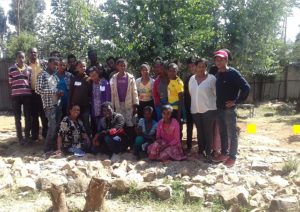On Sunday, Jonathan shared from Zechariah 7 how the Israelites asked God if He wanted them to fast. God responded, through Zechariah, what He truly wanted:
“Administer true justice; show mercy and compassion to one another. Do not oppress the widow or the fatherless, the foreigner or the poor.”
It sounds so nice, doesn’t it?
“Justice, mercy, and compassion;” words we’d print on a throw pillow or stencil on our wall in large script font.
So why is it so hard to do? Why, over and over in the Bible, does God have to tell the Israelites that He doesn’t desire religious activities like fasting, but this true fast, as mentioned in Isaiah 58:
“Is this not the fast that I have chosen:
To loose the bonds of wickedness,
To undo the heavy burdens,
To let the oppressed go free,
And that you break every yoke?
Is it not to share your bread with the hungry,
And that you bring to your house the poor who are cast out;
When you see the naked, that you cover him,
And not hide yourself from your own flesh?”
It sounds so inspiring, grand, and noble, does it not? So why do the Israelites, and why do we, have to be told the same thing over and over?
Here’s my thesis: While justice, mercy, and compassion sound so nice, the work of justice, mercy, and compassion isn’t nice at all. It’s hard, tiring, and complicated.
The whole reason we need the throw-pillow virtues of justice, mercy, and compassion is because there is injustice, oppression, and poverty. And injustice, oppression, and poverty aren’t simple problems plaguing the world. They’re ugly, three-headed monsters. I love the simplicity of Isaiah, but if only it was as easy as giving someone bread or your coat.
Can you think of a more contentious and controversial question than how to fight injustice? (If that doesn’t sound controversial to you, add the word “racial” in front of it.) Or is there a more convoluted current topic than who exactly is “oppressed” in the United States and how to fight it? Or how to “solve” poverty? These are amongst the most difficult, contentious, and complicated questions we face in society today.
No wonder we’d rather fast for a day or have a 20-minute quiet time and call our “spiritual duty'”done.
Here’s what I’m learning and what I need to preach to myself: Doing the work of compassion, mercy, and justice is really hard.
Perhaps it sounds incredibly obvious to you, but it’s not always obvious to me. I think that if I’m doing the “right” work, it will feel glorious and rewarding. But let me be honest with you: It feels really bad to me a lot of the time.
One small way I’ve tried to be part of this work is through my career at nonprofits, first in poverty alleviation and now in fighting human trafficking at The Exodus Road. It sounds very noble and nice, doesn’t it?
But it doesn’t always feel that nice. In fact, having a daily peek into the injustice of human trafficking isn’t nice at all. It’s vile. It’s defeating. It’s depressing. Trying to respond to poverty doesn’t always feel all that nice either. You come across messy lives. Hard questions about how to actually help. And there’s often someone waiting in the wings saying, “You’re doing it wrong,” or “You’re actually the problem.” While criticism is important so we can continue to learn and hone our approaches to complex issues, man, it can feel bad — at least for me.
And I’m not even on the frontlines of these fights — I work behind a computer screen. How much more is this true for people doing the agonizing in-person work? They are likely to receive criticism, setbacks, and disappointment as their daily heritage.
I like niceness. The Enneagram description of my personality type (4w3) is “high tea aristocrat.” It’s apt. My perfect day would be sipping Earl Gray in a hand-painted teacup and gazing out of the castle windows of Glen Eyrie at the towering Queen’s Canyon, far from the issues of poverty and oppression.
When things aren’t nice, or when they don’t feel nice, it’s easy for me to think that something is wrong. That I must be doing the wrong thing or heading in the wrong direction. I need to fix it so that things feel nice again.
I need to remember that the true fast God desires isn’t always going to feel right. It’s not going to feel nice. It’s going to be hard. I’m going to want to turn away and look down into my teacup and perhaps into a nice book on the couch. Back to my comfortable, sanitized life.
Frankly, I’m tired of hard, and I want easy. I’m so exhausted by the culture wars (such as how to respond to injustice and oppression), that I could sleep for a whole year. It feels bad — and I just want to be happy.
But now I’m sounding like the child Jonathan mentioned in his sermon. As Jonathan reminded us, the goal of our God-parent isn’t to make us happy children, it’s to grow us into good adults. And we don’t get there by doing what’s easy and nice, sipping tea on the couch. We get there by doing the chores. The beautiful but gut-wrenching work of justice, mercy, and compassion.
This is a pep talk to myself, but maybe you’ll benefit from it too:
I know it’s hard, but keep going. Sometimes the hard things are the right things. Don’t give in to the childish desire to look away and inward. Keep pressing forward toward justice, mercy, and compassion, even when it stinks. Be resilient. Comfort isn’t the goal. God’s goodness is the goal, and that never came to pass easily.
As we read in Haggai 2:4 last week (in my paraphrase): “Be strong and get to work, for I am with you.”



